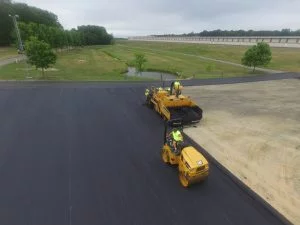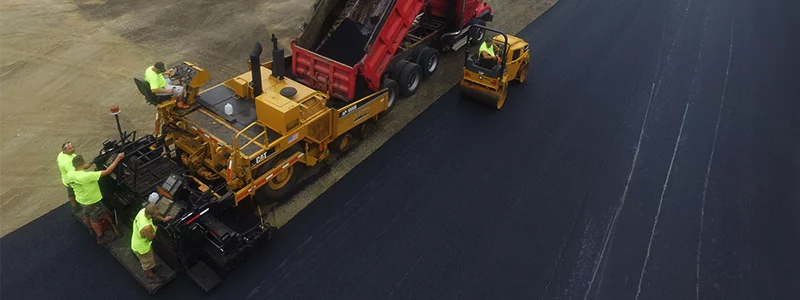The answer to the extremely common question “can I lay new asphalt over old concrete” is yes you can but we discourage it. While it is safe to pave asphalt over concrete, there are several reasons why we do not recommend this method.
 Unstable Concrete Base – Concrete is not a compacted surface because of how hard it is when dry. Because of this, the base under your concrete may not be as stable as an aggregate base would be for an asphalt project. So, when concrete slabs crack, they can move slightly with traffic. With an unstable base, this moving can occur more often. As we’ve discussed extensively in past blogs, the structural integrity of the base of your asphalt surface is extremely important in determining the lifespan of your asphalt. If concrete’s base is unstable, and the concrete joints and cracks are moving with expansion, your asphalt base is basically compromised before the asphalt is even laid, and a concrete base that moves with traffic will damage any asphalt laid on top of it.
Unstable Concrete Base – Concrete is not a compacted surface because of how hard it is when dry. Because of this, the base under your concrete may not be as stable as an aggregate base would be for an asphalt project. So, when concrete slabs crack, they can move slightly with traffic. With an unstable base, this moving can occur more often. As we’ve discussed extensively in past blogs, the structural integrity of the base of your asphalt surface is extremely important in determining the lifespan of your asphalt. If concrete’s base is unstable, and the concrete joints and cracks are moving with expansion, your asphalt base is basically compromised before the asphalt is even laid, and a concrete base that moves with traffic will damage any asphalt laid on top of it.- Expansion Joints Crack Asphalt – One difference between asphalt and concrete is that concrete has expansion joints. As mentioned above, over time the expansion joints will move, leading to concrete cracks and a compromised base. Laying asphalt over concrete, will likely lead to this new asphalt forming cracks in the same spots that the concrete expansion joints have cracked below. This will most commonly occur during expansion and contraction due to heat and/or freeze-thaw cycles.
- The Unknown – Simply, when laying asphalt on top of an existing surface, there is no way of knowing what the base looks like below. In the case of laying asphalt over existing asphalt, it can at least be assumed (if the previous asphalt was laid by a professional) that the base was handled and installed up to asphalt laying standards. However, as mentioned above, it’s common for the base conditions to be overlooked or ignored when laying concrete due to its hardness and strength.
- Lessened Longevity – Due to these unstable base conditions and the unknowns addressed above, the overall lifespan of asphalt, if you lay the asphalt over concrete, will be shortened, and this asphalt will need more repairs quicker, and more frequently.
 Asphalt is a great material, and often a better choice than concrete for your driveway and commercial parking lot for several reasons. It is more durable during fluctuating temperature due to its flexibility, it is a cheaper material to lay, it requires cheaper maintenance, and its installation process is easier. But the success and longevity of your asphalt surface is ultimately determined by its base. Asphalt surfaces last longer, look better, and overall are more successful when they are built from the ground up. This allows us to control the base and ensure that it is stable and built to last.
Asphalt is a great material, and often a better choice than concrete for your driveway and commercial parking lot for several reasons. It is more durable during fluctuating temperature due to its flexibility, it is a cheaper material to lay, it requires cheaper maintenance, and its installation process is easier. But the success and longevity of your asphalt surface is ultimately determined by its base. Asphalt surfaces last longer, look better, and overall are more successful when they are built from the ground up. This allows us to control the base and ensure that it is stable and built to last.
If you are planning on making the change from concrete to asphalt, removing the old concrete first is the best option. When investing in a new parking lot, you want to ensure that it is done right the first time, and that it will last as long as possible. Installing asphalt over concrete is ultimately starting your asphalt out on the wrong foot and could lead to premature cracking, deterioration, and overall instability. Contact a trained professional like EastCoat Pavement for your free parking lot paving consultation today, and make sure that your switch from concrete to asphalt is completed correctly!



